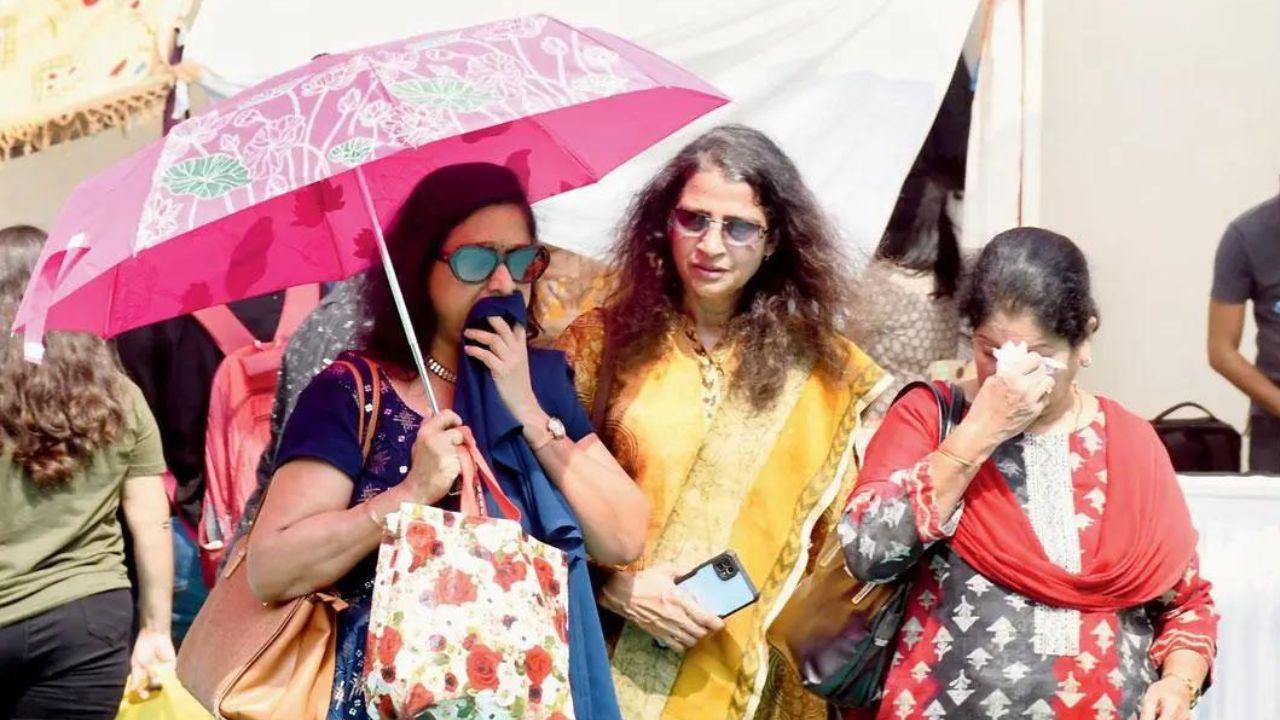As mercury is said to touch 40 degrees Celsius in the coming days, Mumbai doctor shares quick tips to shield yourself from extreme heat

Precautionary measures are crucial in preventing heat exhaustion, particularly for vulnerable populations like the elderly. File photo
The India Meteorological Department has predicted a rise in temperature in the coming days. This indicates a rise in summer ailments among citizens, especially those stepping out in the sun frequently. Taking into account the soaring heat in Mumbai, we dialled a city health expert who shares quick tips to protect yourself during hot weather conditions.
ADVERTISEMENT
“During summer, there is a notable increase in cases of heat-related illnesses, with heat exhaustion being a prominent concern,” says Dr Divya Gopal, Internal Medicine, Sir HN Reliance Hospital and Research Centre.
As detailed by Gopal a heatwave is officially recognised when the maximum temperature in a specific area reaches 40 degrees Celsius or higher for plain regions and 30 degrees Celsius or higher for hilly regions. Sudden spikes in temperature, surpassing the normal range, can disrupt the body's natural temperature regulation mechanisms, leading to various heat-related illnesses such as heat cramps, heat exhaustion, heatstroke, and hyperthermia.
She lists down common heat-induced health issues:
Heat exhaustion: It occurs when the body overheats, often due to exposure to high temperatures combined with high humidity and strenuous physical activity. It is one of three heat-related illnesses, ranging from mild heat cramps to severe heatstroke.
Heat cramps: At the initial stage, heat cramps are characterised by intense muscle spasms resulting from salt and water loss due to heat exposure. These spasms, typically occurring in the hands, calves, and feet, may cease spontaneously, but residual soreness can persist for up to 48 hours.
Heat exhaustion: It happens at the subsequent stage and is more serious. It is marked by a core body temperature rise to 101-104 degrees Fahrenheit. Symptoms include headache, low-grade fever, nausea or vomiting, increased thirst, weakness, muscle aches, reduced urine output, agitation, and possible fainting due to lowered blood pressure.
Heatstroke: It represents the most severe stage and constitutes a medical emergency. It occurs when the body's core temperature exceeds 104 degrees Fahrenheit due to prolonged heat exposure or physical exertion. Symptoms include confusion, dry and reddened skin, lack of sweating, organ failure, and potentially convulsions.
Gopal states, “Precautionary measures are crucial in preventing heat exhaustion, particularly for vulnerable populations like the elderly. If experiencing symptoms, cease activity, rest in a cool environment, hydrate with cool water or sports drinks, loosen clothing, apply cold compresses, and seek medical attention if symptoms worsen or persist beyond an hour.”
She adds, “Recovery typically takes about a week, during which rest and avoidance of hot weather and strenuous activity are advised. If assisting someone with heat exhaustion, seek immediate medical aid if they exhibit confusion, loss of consciousness, or inability to drink.”
Gopal lists down common preventative care to follow throughout the summer season:
Stay hydrated: Increase fluid intake to prevent dehydration. Consume ample water, fruit juices, or vegetable juices throughout the day. In extreme heat and humidity, consider replenishing electrolytes with sports drinks or homemade alternatives like ORS, lassi, rice water, lemon water, or buttermilk.
Opt for lighter meals: Choose foods with high water content such as fruits (like strawberries and oranges), cucumber, and lettuce. Lighter meals aid in hydration and help to keep the body cool.
Hydration during exercise: Before engaging in moderate to high-intensity workouts, drink 17 to 20 ounces of fluid two to three hours prior. During exercise, consume seven to 10 ounces of water every 20 minutes, irrespective of thirst. After exercise, replenish fluids with an additional eight ounces within 30 minutes.
Avoid dehydrating substances: Steer clear of beverages containing caffeine or alcohol, as they can exacerbate fluid loss and worsen heat-related illnesses. Individuals with specific medical conditions should consult their healthcare provider before altering their fluid intake.
Utilise cooling methods: Carry and use cooling sprays when outdoors in the heat. Keep curtains or blinds closed during peak daytime temperatures to maintain a cool indoor environment.
Ensure safety: Never leave children, elderly individuals, or pets in parked cars, as temperatures inside can escalate rapidly. Seek shelter in air-conditioned buildings, take cool showers at least twice daily, and wear lightweight, breathable cotton clothing, along with protective gear like goggles, hats, scarves, and comfortable footwear.
Time activities wisely: Plan outdoor activities during the cooler parts of the day and avoid strenuous exercise during peak heat hours.
Care for vulnerable individuals: Check on neighbours, especially those living alone, and assist the elderly, children, individuals with medical conditions, and pets.
Also Read: Scorching summer in Maharashtra: Mumbai expert shares handy tips to protect children from the heat
Disclaimer: This information does not replace professional medical advice. Consult a qualified specialist or your physician for personalised guidance.
 Subscribe today by clicking the link and stay updated with the latest news!" Click here!
Subscribe today by clicking the link and stay updated with the latest news!" Click here!







